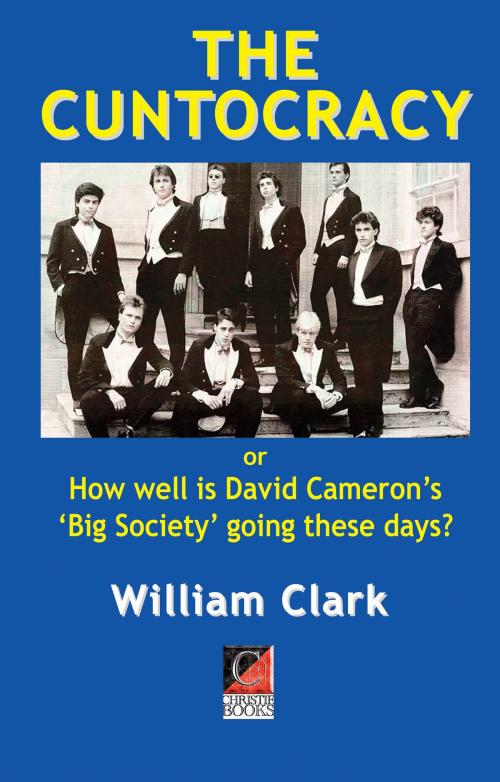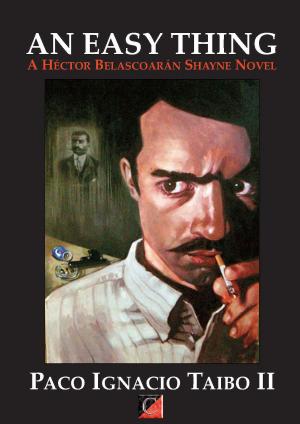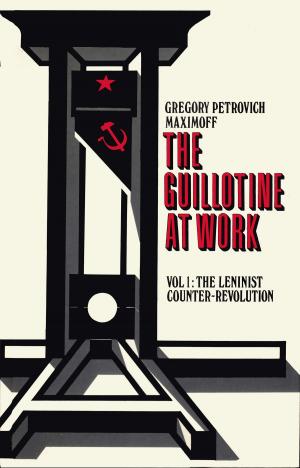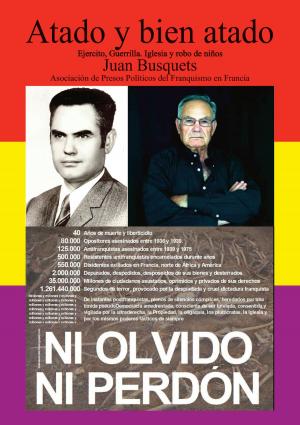THE CUNTOCRACY
or How well is David Cameron’s ‘Big Society’ going these days?
Nonfiction, Social & Cultural Studies, Political Science, Government, Political Parties, Politics, History & Theory| Author: | William Clark | ISBN: | 1230000667548 |
| Publisher: | ChristieBooks | Publication: | September 16, 2015 |
| Imprint: | ChristieBooks | Language: | English |
| Author: | William Clark |
| ISBN: | 1230000667548 |
| Publisher: | ChristieBooks |
| Publication: | September 16, 2015 |
| Imprint: | ChristieBooks |
| Language: | English |
Why not call the present political system a ‘cuntocracy’? It is most certainly not a democracy—at least not the type any one would want. We need a new name for not just what our leaders do to us because of greed and stupidity: we need an accurate irrefutable term for all of society’s organisation as an undesirable but innate feature of the effects of the power-hungry. We need a term who’s very existence and use will return power to the ordinary people—or at least give them a voice and provide a way to talk back to those who pose as leaders but take us nowhere. If people in power object: then the term is working.
So what are our base assumptions? Well, there is probably only one ‘law’ that we could say social science ‘discovered,’ and this seems to have been by sheer flippancy. This was Lord Acton’s statement (in a letter to a Bishop) that all power tends to corrupt and absolute power corrupts absolutely. No one has thought to extrapolate our one law further to establish its social determinants. You are simply not allowed to. Nevertheless, we can adapt Acton’s Law into: all power tends to create cunts and absolute power creates total cunts.
If power and cuntishness are thus implacably entwined we can say that they would form a metaphysical pathos. An inescapable trap of becoming a cunt awaits the power-hungry individual: a trap made of fate and vanishing freedom, confusion and loss of values, emotional colouring whether they are aware or not. If you really believe that you rather than all the others should be in control the result is pessimism and fatalism towards all else, including analysis of the situation. This trap gives rise to a functional rationality to keep the illusion going: the cuntocracy. Max Weber’s concept of the inescapable ‘Iron Shell of Bureaucracy,’ or Marx’s ‘Barbarism’ as the incurable ‘leper of civilisation’ point to its social psychology.[1]
If mention of ‘capitalism’ is always off the media agenda, so that its effects on society can always be ignored or obfuscated, then we are being tacitly urged to switch to something else, something we can see everyday and everywhere: a cuntocracy. Who would need a lengthy theoretical excursion into the reality of a cuntocracy when they daily encounter the activities of every bureaucracy, or have recently spoken to their boss, or flicked through a few television channels and caught sight of the Police, Politicians, Bankers and Media Moguls saying something? So, given our present system of rewarding the wealthy for robbing the poor, it is vital that this reality is reflected in a terminological exactitude open to every citizen: other terms lack cuntocracy’s profound poetic grace.[2]
Most of them have come up with nothing particularly useful, but sociologists tell us that they have laboured away to arrive at an account of why our society is the way it is. Let us leave them to it, and, with one term, state who is in control, as much as it can be said anyone is in control, and how they pull off the con. The advantage of ‘cuntocracy’ is that it does all this sociological work for us. But there is a problem here: sociologists make a living sublimating the ways of the powerful, so that people comply with directives from ‘above’. We are reversing this process for free, so that people do not. For academics, ‘society’ has to remain something of a perpetual mystery, although we know that they know which side of their bread is buttered. Yes, there are writers who have uncovered the existence of a cuntocracy in the ways of the powerful, but they are outcasts. Their work is totally unwanted because it reveals that the cuntocratic world has certainly been made by cunts, and its principles are therefore to be found within the modifications of these cunts’ minds. Universities are there to hide such knowledge (that reality is whatever powerful people say it is) using a sophisticated form of administrative pedagogical cuntocracy that involves the selection and employment of ignorant, lazy cuntocrats to run a system reproducing the cunnus quo at the expense of any encouragement of an awareness of it.
But a system largely based on bribery and compliance should be perfectly amenable for our purposes of selling the term, normalising it. If we wish to convince the intellectuals so that they can aid us spread the word, we will have to start by examining the theorists on whom the principles of the cuntocracy are clearly dependent: those who advanced being a ‘total cunt’ as a desirable condition. In the rest of this essay I will attempt to draft this out.
Why not call the present political system a ‘cuntocracy’? It is most certainly not a democracy—at least not the type any one would want. We need a new name for not just what our leaders do to us because of greed and stupidity: we need an accurate irrefutable term for all of society’s organisation as an undesirable but innate feature of the effects of the power-hungry. We need a term who’s very existence and use will return power to the ordinary people—or at least give them a voice and provide a way to talk back to those who pose as leaders but take us nowhere. If people in power object: then the term is working.
So what are our base assumptions? Well, there is probably only one ‘law’ that we could say social science ‘discovered,’ and this seems to have been by sheer flippancy. This was Lord Acton’s statement (in a letter to a Bishop) that all power tends to corrupt and absolute power corrupts absolutely. No one has thought to extrapolate our one law further to establish its social determinants. You are simply not allowed to. Nevertheless, we can adapt Acton’s Law into: all power tends to create cunts and absolute power creates total cunts.
If power and cuntishness are thus implacably entwined we can say that they would form a metaphysical pathos. An inescapable trap of becoming a cunt awaits the power-hungry individual: a trap made of fate and vanishing freedom, confusion and loss of values, emotional colouring whether they are aware or not. If you really believe that you rather than all the others should be in control the result is pessimism and fatalism towards all else, including analysis of the situation. This trap gives rise to a functional rationality to keep the illusion going: the cuntocracy. Max Weber’s concept of the inescapable ‘Iron Shell of Bureaucracy,’ or Marx’s ‘Barbarism’ as the incurable ‘leper of civilisation’ point to its social psychology.[1]
If mention of ‘capitalism’ is always off the media agenda, so that its effects on society can always be ignored or obfuscated, then we are being tacitly urged to switch to something else, something we can see everyday and everywhere: a cuntocracy. Who would need a lengthy theoretical excursion into the reality of a cuntocracy when they daily encounter the activities of every bureaucracy, or have recently spoken to their boss, or flicked through a few television channels and caught sight of the Police, Politicians, Bankers and Media Moguls saying something? So, given our present system of rewarding the wealthy for robbing the poor, it is vital that this reality is reflected in a terminological exactitude open to every citizen: other terms lack cuntocracy’s profound poetic grace.[2]
Most of them have come up with nothing particularly useful, but sociologists tell us that they have laboured away to arrive at an account of why our society is the way it is. Let us leave them to it, and, with one term, state who is in control, as much as it can be said anyone is in control, and how they pull off the con. The advantage of ‘cuntocracy’ is that it does all this sociological work for us. But there is a problem here: sociologists make a living sublimating the ways of the powerful, so that people comply with directives from ‘above’. We are reversing this process for free, so that people do not. For academics, ‘society’ has to remain something of a perpetual mystery, although we know that they know which side of their bread is buttered. Yes, there are writers who have uncovered the existence of a cuntocracy in the ways of the powerful, but they are outcasts. Their work is totally unwanted because it reveals that the cuntocratic world has certainly been made by cunts, and its principles are therefore to be found within the modifications of these cunts’ minds. Universities are there to hide such knowledge (that reality is whatever powerful people say it is) using a sophisticated form of administrative pedagogical cuntocracy that involves the selection and employment of ignorant, lazy cuntocrats to run a system reproducing the cunnus quo at the expense of any encouragement of an awareness of it.
But a system largely based on bribery and compliance should be perfectly amenable for our purposes of selling the term, normalising it. If we wish to convince the intellectuals so that they can aid us spread the word, we will have to start by examining the theorists on whom the principles of the cuntocracy are clearly dependent: those who advanced being a ‘total cunt’ as a desirable condition. In the rest of this essay I will attempt to draft this out.















